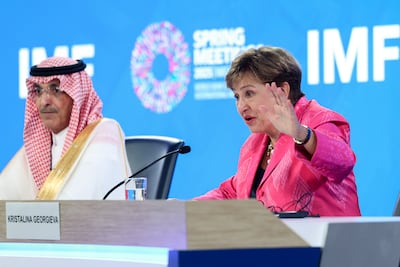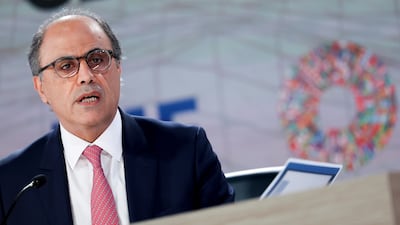The International Monetary Fund's director for the Middle East and Central Asia said on Friday that this week's IMF and World Bank spring meetings have presented an opportunity to reintroduce Syria into international discussions.
Syria's central bank governor and finance minister were in Washington this week to attend a meeting on their country, co-hosted by the leaders of the IMF and World Bank as well as Saudi Finance Minister Mohammed Al Jadaan. The visit was the first by Syrian officials to the US since the toppling of Bashar Al Assad's government late last year.
In an interview with The National, Mr Azour said the meetings have provided Syrian officials the chance to hold talks with representatives from the Middle East and North Africa, and to reinitiate the country to platforms that involve multilateral and regional co-operation.
"This is a country that has been absent from any international forum for more than 16 years," Mr Azour said.
IMF regional director
The meeting followed dialogues in Paris, Brussels and AlUla - the latter being the site where an informal coalition was formed to help provide financial support for countries in the region, such as Syria and Lebanon, that have been devastated by war.
“We recognise that the region is at an important, transformative moment,” Mr Azour said.
Newly formed governments in Lebanon and Syria both offer some hope for citizens affected by conflict and economic turmoil. While Lebanon's new government is tasked with enacting a long list of structural reforms, Mr Azour said "the situation is more complex" in Syria.
In addition to bringing Syria back into the international fold, Mr Azour said Damascus faces the challenges of sanctions that have been in place since the Assad era and a lack of international recognition. These come on top of the country's reconstruction needs.
Syria's self appointed government, led by Ahmad Al Shara, is seeking to rally international support for its reconstruction and recovery needs, which could cost hundreds of billions of dollars. But US President Donald Trump's administration has not yet formally recognised it, and sanctions further complicate those efforts.
Mr Azour said this week's meetings have also provided Syrian officials with the chance to understand the complexity of sanctions still in place from the US and UN.
"It's a long track that would require political support, but also some technical work," he said, adding that the IMF is scaling up its team for Syria.
Mr Azour said Syria must also resolve the arrears it has accumulated with the World Bank, prove its debt is sustainable and that it is able to attract new debt.
"We know how to help countries," he said, adding that the IMF is working with Syrian officials to support them.
Syria has roughly $15 million in arrears to the World Bank, which must be paid off before it can provide assistance.
During a press briefing on Friday, IMF Managing Director Kristalina Georgieva said the fund, the World Bank and partner countries had discussed the need for credible data to rebuild Syria's central bank and expand on its capacity to create revenue.

"The fabric of Syrian society is deeply wounded. It's going to take a lot of work by the Syrians themselves to rebuild it," Ms Georgieva said.
She also confirmed the fund had appointed a mission chief to Syria. The fund conducted its last Article IV mission to Syria in 2009.


